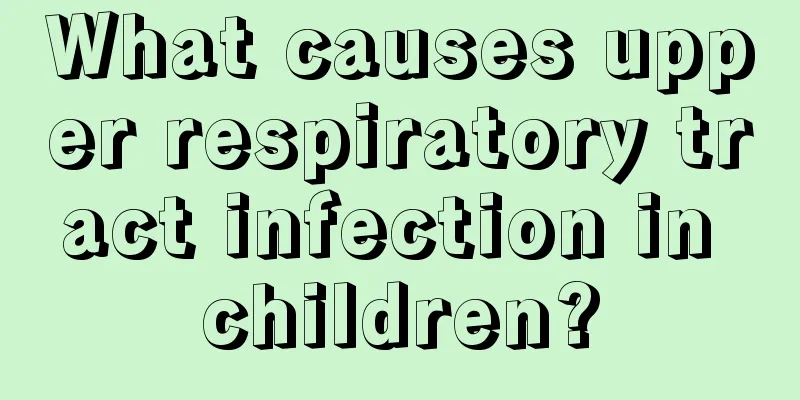What causes upper respiratory tract infection in children?

|
When sending children to kindergarten or elementary school, it is not difficult to avoid seeing some children around suffering from cold symptoms. However, children are still young and do not know how to prevent and avoid being infected themselves, so it is often caused by a cold that spreads to a large area. In more serious cases, children will get upper respiratory tract infection. Some parents don’t know what is going on. Suddenly their children are infected, and they are very worried, afraid that it will affect their children’s health. So what is the matter with children’s upper respiratory tract infection? The main treatment for upper respiratory tract infection is to control the infection and treat the symptoms. Check the routine blood test. If it is a bacterial infection, use antibiotics in time. You can take cefaclor dry suspension orally. Pay attention to changing the lying position frequently to make respiratory secretions easier to expel. Try not to use antitussive or sedatives. You can use expectorants to avoid resisting the cough reflex and affecting the discharge of sputum. For those with severe cough and thick sputum, nebulizer inhalation can be used. You can also take Houzaosan orally, which is an expectorant with Chinese herbal ingredients, specially designed for newborns, children and the elderly. This product can help with symptoms such as excessive phlegm, cough, wind and cold caused by lung heat, mild fever in children, vomiting of milk, and restless sleep. In addition, parents should follow the doctor's instructions to give their children medication on time and provide good home care: 1. Keep warm: Temperature changes, especially cold stimulation, can reduce the local resistance of the upper respiratory tract and aggravate the condition. Therefore, parents should add or remove clothes for the children in time as the temperature changes, especially cover the children with quilts when sleeping to keep the body temperature above 36.5℃. ? 2. Feed more water: Due to different degrees of fever, water evaporation is greater, so you should pay attention to feeding the child more water. It can be supplemented with sugar water or sugar and salt water, or with rice soup or egg soup. The diet is mainly semi-liquid to increase the water content in the body and meet the body's needs. 3. Adequate nutrition: The consumption of nutrients is high, and fever and bacterial toxins affect gastrointestinal function, resulting in poor digestion and absorption. Therefore, nutritional deficiencies in children's bodies cannot be ignored. In this regard, parents should adopt the method of small meals and frequent meals for their children, and provide them with light, nutritious, balanced and easily digestible semi-liquid or liquid diets, such as porridge, cooked noodles, egg custard, fresh vegetables, fruit juice, etc. 4. Turn over and pat the back: When the child coughs and expectorates, it indicates that the secretions in the bronchial tubes have increased. In order to promote the smooth discharge of secretions, nebulizer inhalation can be used to help expectorate, 2-3 times a day, each time for 5-20 minutes. If it is an infant, in addition to patting the back, you should also help the child turn over once every 1-2 hours, so that the child remains in a semi-recumbent position to facilitate the discharge of phlegm. 5. Reduce fever: If the body temperature is below 38.5℃, there is generally no need to give antipyretics. Treatment should focus on the cause of the disease to solve the problem fundamentally. If the body temperature is high, older children can be cooled physically, such as by applying a cold towel to the head or bathing with warm water. However, this method is not suitable for young children, and medication should be used to reduce the temperature if necessary. 6. Maintain a good family environment: The child’s room should be warm, well ventilated and lit, and the air should have a certain humidity to prevent excessive dryness. If there are smokers at home, it is best to quit smoking or go outdoors to smoke to prevent the adverse effects of smoke on the child. That’s all we have to say today about what causes upper respiratory tract infections in children. I believe that after reading this, you will have a new or further understanding of this issue. If there are people around you who suffer from upper respiratory tract infections, you must do a good job of preventing them yourself, and take them for comprehensive examinations and timely treatment to avoid more serious conditions. |
<<: How to treat children's teeth grinding?
>>: What is the correct way to brush teeth for children?
Recommend
What to do if a child has a blocked tear duct
Many people may not understand what the tear duct...
Causes of anemia in five-month-old children
When children are very young, they will either su...
What causes left chest pain in children?
There are many common problems, and there are goo...
What is the normal armpit temperature for children?
The normal body temperature of our human body is ...
Can six-month-old babies drink yogurt?
Many people like to drink yogurt. The nutritional...
What to do if a one-year-old child has poor digestion
I believe everyone has encountered poor digestion...
What are the methods of traditional Chinese medicine to prevent and treat hand, foot and mouth disease?
In recent years, hand, foot and mouth disease has...
What should I do if my child has a mild fever?
It is normal for children to have a low fever, es...
What to do if a 3-year-old child coughs at night
When it comes to coughing, many people have had i...
What is Down's syndrome?
Every child is an angel sent down to earth by God...
Why do children get Kawasaki disease?
Many people may not have heard of Kawasaki diseas...
Traditional Chinese medicine for treating infant eczema
I believe that everyone is very familiar with the...
Is it okay to give a child a bath if he or she has a fever?
For children, their bodies are not fully develope...
What to do if your baby loses hair at three months old
Baby's hair loss is a matter that worries par...
What to do if a child has appendicitis?
Some parents hear their children complain of stom...









